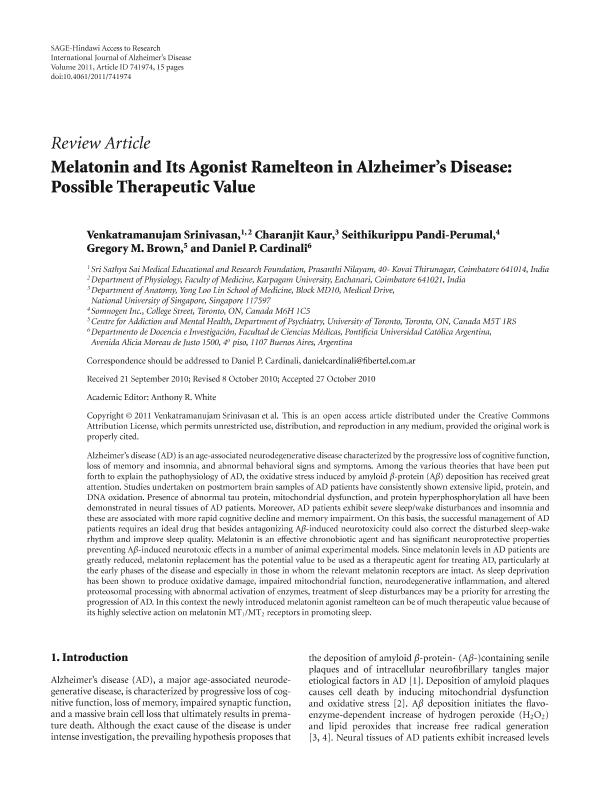Artículo
Melatonin and its agonist ramelteon in Alzheimer's disease: Possible therapeutic value
Srinivasan, Venkatramanujam; Kaur, Charanjit; Pandi Perumal, Seithikurippu R.; Brown, Gregory M.; Cardinali, Daniel Pedro

Fecha de publicación:
03/2011
Editorial:
Hindawi Publishing Corporation
Revista:
International Journal of Alzheimer's Disease
ISSN:
2090-0252
Idioma:
Inglés
Tipo de recurso:
Artículo publicado
Clasificación temática:
Resumen
Alzheimer's disease (AD) is an age-associated neurodegenerative disease characterized by the progressive loss of cognitive function, loss of memory and insomnia, and abnormal behavioral signs and symptoms. Among the various theories that have been put forth to explain the pathophysiology of AD, the oxidative stress induced by amyloid β-protein (Aβ) deposition has received great attention. Studies undertaken on postmortem brain samples of AD patients have consistently shown extensive lipid, protein, and DNA oxidation. Presence of abnormal tau protein, mitochondrial dysfunction, and protein hyperphosphorylation all have been demonstrated in neural tissues of AD patients. Moreover, AD patients exhibit severe sleep/wake disturbances and insomnia and these are associated with more rapid cognitive decline and memory impairment. On this basis, the successful management of AD patients requires an ideal drug that besides antagonizing Aβ-induced neurotoxicity could also correct the disturbed sleep-wake rhythm and improve sleep quality. Melatonin is an effective chronobiotic agent and has significant neuroprotective properties preventing Aβ-induced neurotoxic effects in a number of animal experimental models. Since melatonin levels in AD patients are greatly reduced, melatonin replacement has the potential value to be used as a therapeutic agent for treating AD, particularly at the early phases of the disease and especially in those in whom the relevant melatonin receptors are intact. As sleep deprivation has been shown to produce oxidative damage, impaired mitochondrial function, neurodegenerative inflammation, and altered proteosomal processing with abnormal activation of enzymes, treatment of sleep disturbances may be a priority for arresting the progression of AD. In this context the newly introduced melatonin agonist ramelteon can be of much therapeutic value because of its highly selective action on melatonin MT1/MT2 receptors in promoting sleep.
Palabras clave:
Alzheimers disease
,
Melatonin
,
Mild Cognitive Impairment
,
sleep
Archivos asociados
Licencia
Identificadores
Colecciones
Articulos(SEDE CENTRAL)
Articulos de SEDE CENTRAL
Articulos de SEDE CENTRAL
Citación
Srinivasan, Venkatramanujam; Kaur, Charanjit; Pandi Perumal, Seithikurippu R.; Brown, Gregory M.; Cardinali, Daniel Pedro; Melatonin and its agonist ramelteon in Alzheimer's disease: Possible therapeutic value; Hindawi Publishing Corporation; International Journal of Alzheimer's Disease; 2011; 3-2011; 1-15
Compartir
Altmétricas



